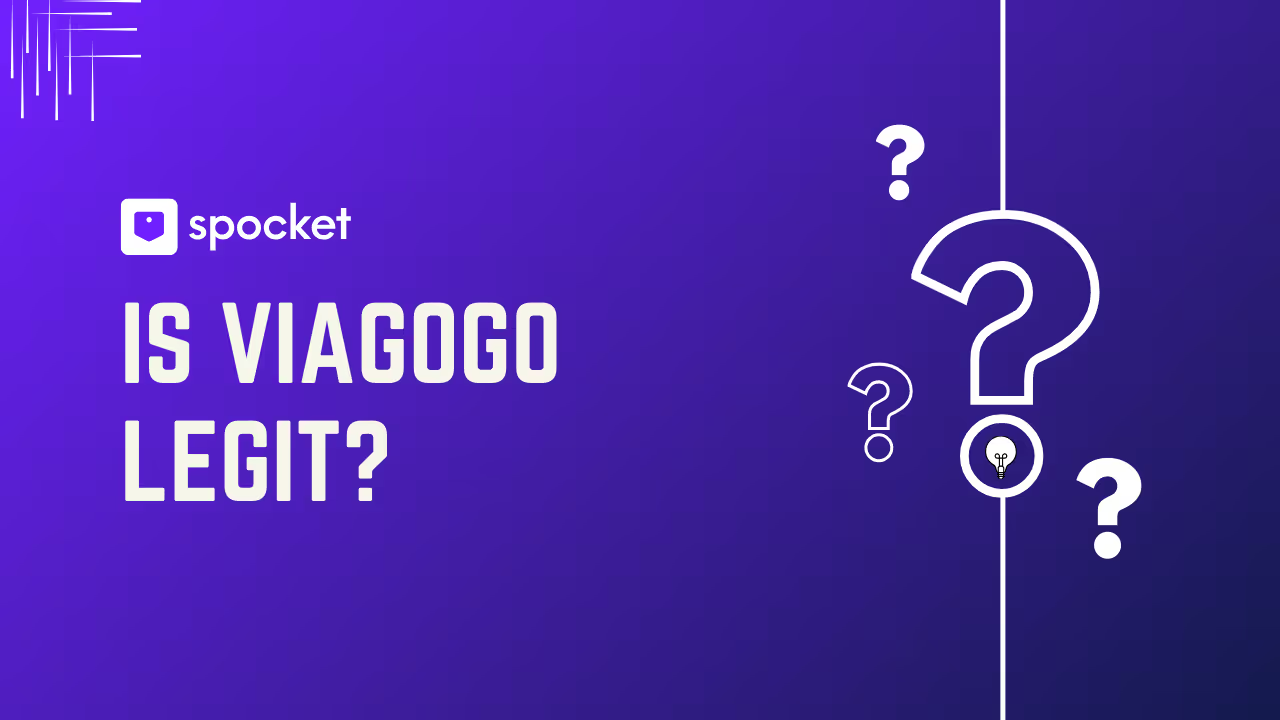Is Viagogo Legit?
Wondering if Viagogo is legit? Get the full review of this popular ticket resale site, including pros, cons, and customer feedback to help you decide if it’s right for you.


Viagogo is a popular online ticket resale platform that allows individuals to buy and sell tickets for a wide variety of events, including concerts, sports games, theater performances, and more. Viagogo’s business model is built on connecting buyers with ticket resellers, allowing people to find tickets for events that may be sold out or difficult to access through primary sellers.
But as with any ticket resale platform, the question often arises: Is Viagogo legit? Can you trust the platform to provide valid tickets, or are there hidden risks that could leave you with a bad experience? In this comprehensive review, we’ll break down everything you need to know about Viagogo, including its legitimacy, reputation, customer experiences, and more.
What is Viagogo?
Viagogo is an online marketplace for buying and selling tickets to live events, including concerts, sports games, theater performances, and festivals. Founded in 2006, the platform allows individuals to resell tickets they no longer need, while also providing consumers with access to tickets for events that may be sold out or difficult to find through traditional primary ticket vendors.

Viagogo operates as a secondary ticket marketplace, meaning that tickets listed on the site are often sold by third-party sellers, rather than directly from the event organizers. As a result, ticket prices are generally set by the sellers, which can sometimes result in price inflation, especially for high-demand events. Despite this, Viagogo continues to be a popular platform for securing hard-to-find tickets to major events.
Viagogo is available in many countries, making it a global platform for ticket resale. It offers a wide variety of event tickets, from concerts by world-renowned artists to major sporting events like the Super Bowl or Olympics, and Broadway shows to intimate theater performances.
How Does Viagogo Work?
Viagogo is a secondary ticket marketplace, which means that it acts as an intermediary platform where buyers and sellers can meet and transact for tickets to events. Unlike traditional ticketing platforms like Ticketmaster, which sell tickets directly from the event organizers, Viagogo connects individuals who are reselling their tickets with people who need them. This model allows for a wide range of events to be accessible, including those that may have already sold out or are in high demand.
Here’s a deeper breakdown of how Viagogo functions:
1. Selling Tickets on Viagogo
Viagogo allows individuals to list their event tickets for resale on the platform. These sellers can range from:
- Fans who can no longer attend the event and want to recoup their costs.
- Ticket brokers who specialize in reselling tickets as a business.
- Professional resellers who buy large quantities of tickets and sell them at a markup.
The selling process on Viagogo is straightforward. Sellers simply create a listing for their tickets, indicating the event, seat location, and price they wish to charge. Viagogo’s user-friendly interface allows sellers to easily set up their listings and manage their sales.
While this system makes it easy for sellers to find a market for their unused tickets, the main issue here is that prices are set by the sellers, and Viagogo doesn’t impose any pricing regulations. This can sometimes result in inflated prices, especially for high-demand events like concerts, sports finals, or theatre shows.
2. Buying Tickets on Viagogo
For buyers, the process is just as simple. You can search for an event by name, date, or location, and Viagogo displays listings from multiple sellers. Buyers can see a range of tickets for an event, often at varying price points depending on the seller. The platform allows customers to compare prices easily, but since prices are set by individual sellers, the cost of tickets can fluctuate dramatically, especially for popular events.
Viagogo offers a wide selection of tickets for everything from sports events to music concerts and theatre performances, making it an attractive option for those seeking tickets to sold-out events. However, it’s important for buyers to be aware that prices for certain tickets, particularly those for in-demand events, may be significantly higher than face value.
3. Pricing on Viagogo: Seller-Set Prices and Market Forces
One of the distinguishing features of Viagogo compared to traditional ticket sellers is that sellers have complete control over the pricing of their tickets. They can set their own price based on factors such as:
- Demand: If an event is highly popular, sellers may increase the price of tickets to capitalize on high demand.
- Ticket scarcity: For sold-out events, sellers may price their tickets higher since there are fewer available.
- Market trends: Sellers may adjust their prices based on the performance of other listings or how close the event date is.
This system allows Viagogo to provide tickets for a wide variety of events, even those that are no longer available on primary marketplaces. However, it also means that buyers can end up paying much more than they would if they bought tickets directly from the event organizers.
4. Service Fees and Hidden Costs
While Viagogo offers a convenient platform to buy and sell tickets, there’s one key aspect that has raised concerns for many buyers and sellers: fees.
In addition to the ticket price itself, Viagogo charges service and handling fees that can significantly increase the total cost of purchasing tickets. These fees can include:
- Service fees: A percentage of the ticket price added on top of the base cost.
- Handling fees: Costs associated with processing and delivering the tickets.
- Delivery charges: For physical tickets, delivery may incur additional fees.
One of the biggest issues with Viagogo is that these fees are not always clearly disclosed upfront. Many users report being surprised by the high fees when they reach the checkout stage, which can make the overall cost of purchasing tickets much higher than expected. For example, it’s not uncommon for the total fees to add up to 30% or more of the original ticket price.
This lack of transparency has frustrated many users who feel misled by the platform. Unlike other ticket resale platforms that show all fees upfront, Viagogo’s fee structure often leads to a sticker shock at checkout.
5. Ticket Delivery and Buyer Guarantee
One of the key selling points of Viagogo is its Buyer Guarantee, which promises to protect customers in case of problems with their tickets. Viagogo guarantees that:
- The tickets you purchase will be valid and guaranteed entry to the event.
- If there is a problem, such as receiving invalid tickets or missing tickets, Viagogo will either replace them or offer a full refund.
However, some customers have reported issues with receiving tickets on time, particularly when purchasing tickets from resellers. These delays can be frustrating, especially for those who purchase tickets for events happening soon.
6. Viagogo’s Return and Refund Policy
Viagogo’s return and refund policy is another area where buyers often encounter difficulties. While the platform claims to offer refunds for invalid tickets or canceled events, customers have expressed frustration with the refund process, particularly with the lack of clarity around return procedures.
The platform’s return policies can vary depending on the event, ticket type, and seller, so it’s important to read the terms and conditions carefully before making a purchase. Some buyers have reported waiting weeks to receive their refunds, and others have found that Viagogo doesn’t always honor the promises made in the Buyer Guarantee.
Is Viagogo Legit? Understanding the Platform’s Reputation
To determine if Viagogo is a legit platform, it’s important to look at various factors, including customer feedback, pricing transparency, and Viagogo’s buyer protection policies.
Customer Reviews and Reputation
Customer reviews and feedback are essential when evaluating whether a brand or service is legitimate. Viagogo has received both positive and negative feedback, so let’s break it down:
Positive Reviews
- Access to Sold-Out Events: Many customers love the fact that Viagogo offers access to tickets for sold-out or hard-to-find events. It provides an opportunity for fans who missed out on purchasing tickets through traditional outlets like Ticketmaster or Eventbrite.
- Easy-to-Navigate Platform: The website and mobile app are relatively easy to navigate, and customers appreciate the convenience of searching for and purchasing tickets from multiple sellers in one place.
Negative Reviews
- High Prices and Fees: A significant number of customers have expressed frustration with high ticket prices on Viagogo. Because sellers are free to set their own prices, tickets are often sold at marked-up prices, sometimes much higher than their face value. The service fees and handling fees added by Viagogo further increase the overall cost.
- Delayed or Missing Tickets: Some users have complained about receiving their tickets late or not receiving them at all. For fans who purchase tickets for upcoming events, this can be a major problem.
- Customer Service Issues: Viagogo’s customer service has been another point of contention. Many customers report long wait times and difficulty reaching someone for assistance. This issue can be frustrating, especially when trying to resolve urgent issues like missing tickets.
Viagogo Fees: Why Are Tickets So Expensive?
One of the most common complaints about Viagogo revolves around high ticket prices. Here’s a closer look at how the platform's pricing works:
1. Seller-Set Prices
Since Viagogo operates as a marketplace for resellers, the prices of tickets are set by the individual sellers. Sellers can choose any price they want for the tickets they are offering, which often results in price gouging, especially for high-demand events like concerts, sports finals, or sold-out shows. As a result, customers are sometimes forced to pay significantly more than the face value of the tickets.
2. Service and Handling Fees
In addition to the seller’s ticket price, Viagogo charges service fees and handling fees. These extra charges are added on top of the ticket price during checkout and can increase the total cost of your purchase by as much as 30% or more. These fees are often disclosed only at the final step of the checkout process, which can lead to frustrations for customers who didn’t anticipate such high additional costs.
Is Viagogo Safe to Use?
When buying tickets from any online platform, security is a major concern, especially when dealing with personal and financial information. So, how safe is Viagogo to use? Let’s take a look at the platform’s security measures and buyer protections.
1. Buyer Protection
Viagogo offers a Buyer Guarantee to protect customers from receiving invalid tickets or experiencing issues with their purchases. According to the guarantee:
- If a ticket is invalid or does not grant entry to the event, Viagogo will either replace it or offer a full refund.
- If an event is canceled, buyers are eligible for a refund for the ticket’s cost, though service fees may not always be refunded.
While this Buyer Guarantee seems promising, some customers have reported delays in receiving their refunds or experiencing difficulties in getting their issues resolved through customer support.
2. Secure Payment Methods
Viagogo uses secure payment gateways like PayPal, Visa, and Mastercard to process transactions, which helps protect customers' financial data. PayPal, in particular, provides an extra layer of protection, as it allows customers to dispute charges if something goes wrong with the transaction.
However, it’s important to note that Viagogo, like any third-party marketplace, cannot guarantee that all sellers on the platform are reputable. It’s crucial to read customer reviews of specific sellers before purchasing tickets.
Viagogo vs. Other Ticket Resale Platforms
Viagogo is just one of many ticket resale platforms available to consumers. Here’s a comparison of Viagogo with other popular ticket platforms:
1. StubHub
- Pros: StubHub offers a buyer protection program, making it a safer choice for many consumers. The platform is also well-established and trusted by millions of customers worldwide.
- Cons: Like Viagogo, StubHub allows sellers to set their own prices, which can result in inflated ticket prices.
2. SeatGeek
- Pros: SeatGeek offers price transparency, showing you the full cost of tickets upfront, including all fees. It also provides interactive seating charts to help you make the best choice.
- Cons: SeatGeek also deals with resellers, so tickets can still be expensive for popular events.
3. Ticketmaster
- Pros: As the primary seller for most events, Ticketmaster offers official pricing and doesn’t rely on third-party sellers. It’s the go-to platform for purchasing tickets directly from event organizers.
- Cons: Tickets for high-demand events can sell out quickly, and Ticketmaster doesn’t offer as many options for sold-out events as Viagogo.
How to Stay Safe When Using Viagogo
If you decide to buy tickets from Viagogo, here are some tips to ensure a safer and more satisfying experience:
- Check Seller Ratings: Always check the seller’s ratings and reviews before making a purchase to ensure their reliability.
- Understand the Total Price: Be aware of the service fees and handling charges before completing your purchase.
- Look for Buyer Protection: Ensure that the ticket is covered by Viagogo’s Buyer Guarantee and that you understand how it works.
- Plan Ahead: To avoid last-minute issues, try to purchase tickets as early as possible and avoid buying them too close to the event.
Conclusion: Is Viagogo Legit?
Viagogo is a legitimate ticket resale platform, but it comes with some risks. While it offers access to tickets for hard-to-find events, high prices and hidden fees can be frustrating. Additionally, customer service issues and the potential for late or missing tickets can cause problems for buyers.
If you’re comfortable with the extra costs and buyer risks, and you’re willing to take a chance on getting tickets for a sold-out event, Viagogo may be a suitable platform for you. However, if you’re looking for more transparency and guaranteed pricing, you might want to explore other platforms like StubHub, SeatGeek, or Ticketmaster for a more straightforward experience.
FAQs About Viagogo
Is Viagogo a trustworthy site?
Yes, Viagogo is a legitimate platform, but it has received mixed reviews due to pricing concerns and customer service issues.
Why are Viagogo tickets so expensive?
Viagogo allows sellers to set their own prices, and service fees are added on top, leading to inflated ticket prices.
Can I get a refund from Viagogo?
Viagogo offers a Buyer Guarantee that includes refunds for invalid tickets or canceled events, though service fees may not be refunded.
Is Viagogo safe to use?
Viagogo uses secure payment methods like PayPal and Visa, providing a safe transaction process for users.
How do I contact Viagogo customer service?
Viagogo can be contacted via their website’s support page, but response times can be slow, especially during peak seasons.
Launch your dropshipping business now!
Start free trialRelated blogs

Dropshipping Niche Research: Finding Low-Competition, High-Margin Products
Use dropshipping niche research to uncover low competition, high margin products. Cut guesswork and build a reliable brand from day one.
.avif)
Customer Journey Maps: How to Get Started for Beginners (2026 Guide)
Learn what a customer journey map is and what phases it entails. Our guide for beginners helps businesses improve user experiences.

How Do I Research Market Trends for My Store?
Learn how to research market trends for your dropshipping store using powerful trend tools, data insights, and Spocket strategies to stay ahead of the competition.


































